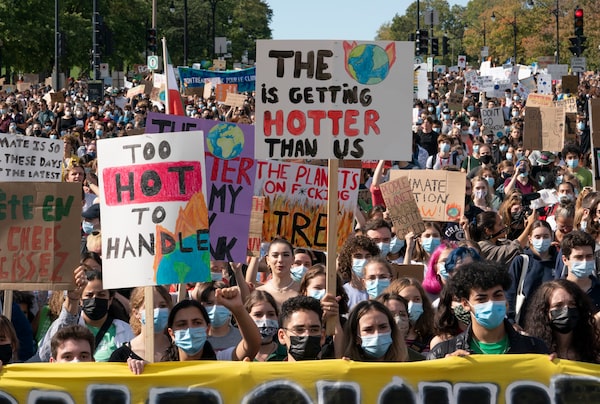
Students take part in a climate change protest, in Montreal, Friday, Sept. 24, 2021.Ryan Remiorz/The Canadian Press
Let’s Talk Science and the Royal Society of Canada have partnered to provide Globe and Mail readers with relevant coverage about issues that affect us all – from education to the impact of leading-edge scientific discoveries.
Johanna Busch is an Educational Specialist with the Digital Development team at Let’s Talk Science
As a middle school science teacher, I felt ready to teach students about climate change. I prepared hands-on activities demonstrating how greenhouse gases in the atmosphere trap heat. I found dozens of articles and videos discussing different ecosystem impacts and adaptation strategies.
What I was not prepared for was the strong emotional reactions of my students. Learning about climate change sent some students spiraling into cycles of anxiety, some even requiring clinical support. They asked questions about whether the world was ending and if we were all doomed.
Can you blame them? Climate change can be a scary topic. Youth are dealing with the frustration of being handed a set of problems and feeling like they are expected to solve them all. The mental health impacts of dealing with climate change are increasingly being studied. According to Dr. Anna Weinberg, a clinical psychologist at McGill University, and member of the Royal Society of Canada’s College of New Scholars, the uncontrollability, unpredictability, and uncertainty inherent in climate change make it especially anxiety provoking.
As with many science topics, it is not enough for us to just explain the processes and mechanics of climate change to youth. When discussing everything from vaccines to melting sea ice, adults need to be ready to support youth emotionally, when talking about these tough topics. Here are some strategies to help with this:
- Listen and validate their feelings.
Actively listen to how youth are feeling after reading an article about wildfires or droughts. Validate their feelings by explaining that these are completely normal emotional responses to a scary situation. Make sure they understand that their voice is important. We desperately need the new perspectives and innovation that youth bring to this conversation.
- Give children and youth a sense of power over how they respond.
According to Dr. Weinberg, giving youth choices over how they want to take action can help them feel empowered and more in control. Youth may not be able to control the situation, but they can control their response. Help youth explore the different ways that they could take action either by changing some of their personal behaviors or through advocacy at a larger scale.
For example, youth could choose to reduce waste by using fewer plastic bags, upcycling instead of buying new items, or writing letters to politicians asking for regulations to limit plastic waste. Ask them for their opinions on the most effective way of taking action and support them in achieving this.
- Build connections with others who are addressing this problem.
All problems feel more solvable when you aren’t facing them alone. Help youth connect with others in your community who are addressing climate change. This could involve joining – or starting - a green club at school or in the community or planning a clothing swap with their friends and classmates.
Young people are smart. They know that one individual choosing to bike instead of drive to school won’t measurably reduce greenhouse gas emissions. However, joining in a larger project helps youth to see how their actions can make a difference if many people participate. For example, the Clothing4Climate project from Let’s Talk Science encourages students to share how they are taking action against climate change with other children and youth across Canada. Projects like this help youth understand that they are not personally responsible for solving this entire problem. They are working together with others all over the world.
Teaching the facts and mechanics of a science topic isn’t enough for youth. Their emotional reactions and life experiences are central to how they process and master new scientific understanding. Social-emotional support can help them make sense of challenging topics from vaccinations to climate change. Using these strategies can help you build deeper relationships with the kids and students in your life and help them feel empowered to address challenging problems.